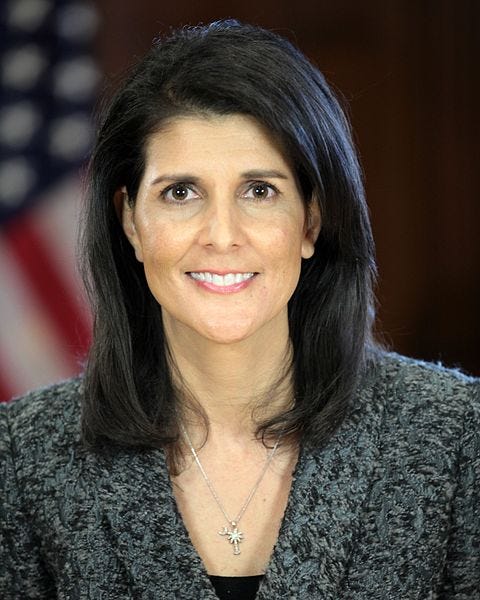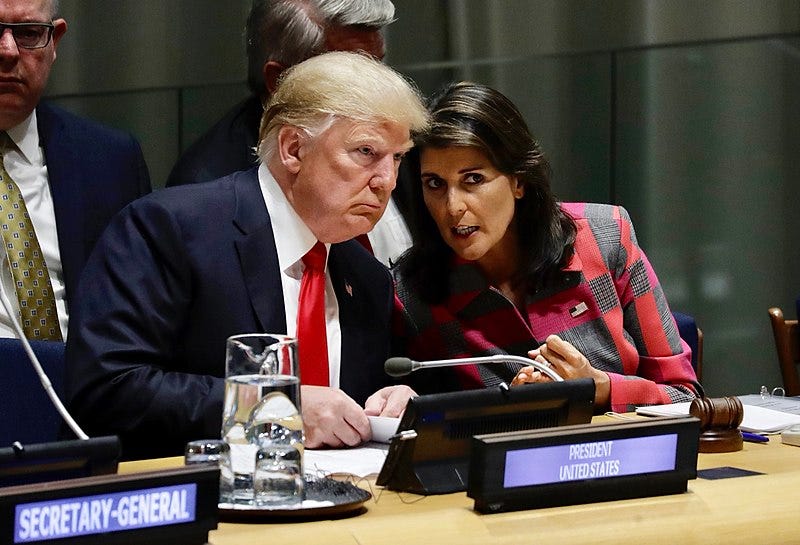Can Nikki Haley Wound the Trump Campaign?
And by "wound," I mean is the Haley campaign capable of causing the Trump campaign to bleed out across the country from a stinging loss?
Timing is everything. And “this Nikki Haley moment” occurs at a defining time in the 2024 election cycle as primary voters in the first few states — Iowa (Jan. 15), New Hampshire (Jan. 23), South Carolina (Feb. 24) and Michigan (Feb. 27) — finally take notice of the candidates. Up until now, the close observers of the race have been beltway pundits and politics obsessives (sheepishly raises hand), only a fraction of the eventual voting electorate, although you would not notice it from the coverage on cable and on podcasts.
It appears increasingly apparent that Trump will be the Republican party’s nominee for President. There — I said it. The indictments, the damning charges brought against him all served, in the end, to strengthen his political position within the party. A Trump vote, it seems, has embroidered into it a certain acceptance of corruption, of the “we need a fundamentally corrupt person to smash a fundamentally corrupt state of Being” variety. “According to the average of polls, Mr. Trump has been the first choice of a majority of Republican voters ever since that first arrest and court appearance,” wrote Anthony Zurcher for BBC. “…Indicting Mr Trump for challenging the 2020 election results may not resonate with Republicans, considering 84% shared the view that Joe Biden did not ‘legitimately’ win the 2020 election, according to a March CNN survey,” he concludes. And so on.
If Trump indeed is the “Teflon Don” — a Mafioso sobriquet, by the way — then he will probably not pay a substantial political price for election-denial or the January 6th insurrection or even, presumably, if he decides at some point to shoot an innocent person in the face on Fifth Avenue. At least not within his own party. There have already been signals of this anti-climactic outcome — in the failure to impeach in both Houses of Congress and the kid gloves treatment he gets from all of the candidates on the trail, except Christie. The remaining question concerning the bad operetta, is how does it conclude? Does Trump essentially sweep the big four first primaries, then drag the remaining corpses left on the battlefield around the country until they run out of campaign funds?
And yet, here we are: observers of this present Nikki Haley surge, coming on the heels of Mike Pence’s surprising departure (anyone have that on their bingo card?). And of course, timing, which is everything as we’ve already established. Does this surge — roughly two months before the first caucus votes are cast on a frigid Iowa winter’s night — increase, stabilize or evaporate? The quixotic Presidential campaign of Governor Ron DeSantos, Haley’s nearest competitor, appears to be in implosion. This can only be properly construed as a profound boon for Haleyworld. It is exactly what any campaign team would prays after — an imploding frontrunner; a steroidal growth in campaign fundage and the wind at one’s back. Absent some new uptick by Tim “Iowa or Bust” Scott (highly unlikely), Vivek Ramaswami (lol) or an exceedingly late-to-the-party Glenn Youngken, it would seem that Trump gets the nomination and the only candidates left standing are Haley and DeSantos, possible candidates for 2028. But it doesn’t bode well for DeSantisWorld, ‘24 or ‘28, that the moribund campaign has been bogged down in embarrassing questions on podcasts as to whether or not the Governor is wearing “height enhancers” in his cowboy boots to make him appear taller.
The November 8. debate in Miami— the third for Republicans — will be an important one. It will signal that “crunch time” has finally arrived and that the candidate discussions are no longer medieval monastic debates held among initiates. The world is watching now. The Miami debate will be important because it arrives on the scene at a time where voters in primary states that matter are finally hearing their pitches and — mirabile dictu — paying attention. Gaffes are less allowable. The debate acceptance process also provides hard metrics as to how each campaign is doing, as in fundraising amounts, the number of individual donors as well as national polling percentages.
No one has spent more time on the campaign trail in Iowa than Nikki Haley. She has been inside every house, diner, college campus and lodge that will allow her to make her pitch in the state. And so it is not surprising that after every other flavor of fruit — from Scott to Ramaswamy — has been sampled, has had their “surge,” it all falls squarely on Nikki Haley to be the alternative to Trump as we approach the hour of the wolf, the Iowa caucuses. Her gambit, as of now, has paid off; it couldn’t have been better scripted. That is, so long as the bonfire doesn’t exhaust itself by January 15th, Iowa caucus night.

Which leads me to the topic of the newsletter — Could Nikki Haley wound the Trump campaign? And by wound, I mean is the Haley campaign capable of causing the Trump campaign to bleed out across the country from a stinging loss — or, perhaps, a close second-place finish in Iowa? Is the Haley campaign capable of inflicting damage and pain to Trump? If she won Iowa — or came in a close second — would that change the dynamics in New Hampshire? Could she win there? Such an event, if it occurred, would almost certainly strengthen the case for her candidacy in South Carolina, where she was Governor from 2011 to 2017 and thus already a known commodity.
It is, in a sense, so early in the process that any sort of “horserace” politics seems to be more in the service of chatter than of actual, actionable use. And yet, Haley has many items in her political toolbox that make her an intriguing prospect, if not to outright win against the Great Beast in the primary, to make his battle for the nomination more difficult. Not the least of the items in Nikki Haley’s political toolbox is her resume. She is a former Governor of an important (and, early voting) red state as well as a former Ambassador. Neither positions should be tossed aside lightly.
The people like Governors. “Throughout American history, about twice as many governors as senators have been chosen to be standard bearers by the major parties, even though at any given moment there are only half as many sitting governors as sitting senators,” reminds 538 politics. Further, most Governors have no foreign policy experience. Not so with Haley, who was, however undistinguished her tenure, Trump’s Ambassador to the United Nations. I am not a fan of Nikki Haley, but she is qualified for the job and quite cunning at navigating the brackish waters that are the Republican cult of Trump’s fetid personality.
Let me conclude by saying, with gusto, that Nikki Haley will almost certainly not beat Donald J. Trump for the nomination. It is nearly impossible imagining anyone beating Trump for the Republican Party nomination this presidential cycle, with the party constituted as it is. The party, it must be noted, has never formally repudiated Trump for his election-denial and it has never formally censured him for the insurrection. The current Speaker of the House held Trump’s diet coke at the height of election denial. And though Speaker Johnson doesn’t sound or look too crazy, he is a Trumpist and thus a fool. Speaker Johnson is, in fine, the most normal-looking election denier in the crazy caucus. And the Republican Party is a Trump cult of personality, at least until he decides to no quit America altogether and live on some Russian oligarch’s superyacht in international waters where he can eat endangered species and engage in watersports with sex workers at will.
Haley simply cannot win this fight. She has never seen combat against something so fundamentally broken and shameless as is Trump. Further, Nikki Haley is not sufficiently loyal by Trump’s standards to serve even be his Vice President. But she does have the ability, if she leans in on her gender, if she leans in on her Asian-American background, to draw an powerful contrast against Trump. To appeal to Republican-inclined suburban women in red states and in the suburbs of purple states. It will be a difficult needle to thread, to be sure, in a party with so many testosteronal, white supremacists in tow.
And, as I’ve said before, it is a losing cause for the Haley campaign. A gothic, romantic, Southern but definitely lost cause. As doomed as an abandoned and overgrown plantation in a ghost story. But what former Governor and Ambassador Haley does have is the ability to force Trump to fight across the country, to expend argument, in essence to make his campaign bleed — cash, credibility, the optics of an effortless road to the nomination — in such a way that the only person advantaged and energized by the force of her candidacy would be President Joe Biden.
And that, ladies and gentlemen of the jury, is not a bad thing.
“In September, David Marchese, a journalist at the New York Times, interviewed Jann Wenner, the cofounder of Rolling Stone, who was about to publish a book compiling his interviews with seven rock ‘masters,’ all of them white men. In the introduction to the book, Wenner wrote that performers of color were not in his zeitgeist, but Marchese told Wenner that he found this implausible and asked him to articulate the ‘deeper explanation’ for how he picked his subjects; in response, Wenner suggested that women and performers of color whom he could have included were not ‘articulate’ enough at ‘an intellectual level.’ The backlash was swift. The Rock & Roll Hall of Fame Foundation removed Wenner from its board. He ultimately apologized. Marchese’s conversation with Wenner may have been contentious, but that isn’t always the case with his interviews. His interview style is a kind of art.” (Ayodeji Rotinwa/CJR)
“The Rolling Stone story revealed that (HBO’s Casey) Bloys — one of the most powerful and respected executives in the industry — and his senior vice president of drama programming, Kathleen McCaffrey, coordinated online responses to critical reviews and comments about the company by setting up dummy social media accounts to push back against writers at publications like New York Magazine, The New York Times and Rolling Stone. The article included several text exchanges between Bloys, McCaffrey and a former HBO executive assistant named Sully Temori, who was tasked with setting up the fake accounts and who is now suing HBO (the text exchanges were included in Temori’s suit, alleging wrongful termination). In one exchange, McCaffrey wrote to Temori that Bloys is ‘obsessed with Twitter’ adding that ‘He always texts me asking me to find friends to reply… is there a way to create a dummy account that can’t be traced to us to do his bidding,’ she asked.” (Claire Atkinson and Peter Keifer/The Ankler)
“In 1946, Dean Acheson, soon to be named secretary of state, said that ‘the most exclusive club in America’ is ‘the club of men in public life who have resigned in a cause of conscience.’ At the time, Acheson could think of only two members of that club. It’s an exclusive club precisely because of the incentive structure created by official Washington. Those who resign from the Biden administration in protest will face ostracism from the political elite and undying enmity from their former colleagues. Their job prospects will be blighted. Conversely, those who go along with immoral policies will continue to flourish, as the McNamaras, the Kissingers, and indeed the Tony Blinkens have continued to prosper after supporting criminal wars. The price of resignation is high.” (Jeet Heer/The Nation)
“News organizations are assuming a more aggressive posture toward Israel Defense Forces as it escalates its military operations in the Gaza Strip. While civilian deaths mount and the humanitarian crisis grows more severe in the Palestinian territory, spokespersons for Israel's military are being confronted by anchors on live television, pressed to answer for the deaths of innocent families caught in the heavy crossfire. The more critical stance has been particularly pronounced over the last 24 hours, following two blasts at the densely populated Jabalya refugee camp in northern Gaza, which was established in 1948 when Palestinians fled what is now the current state of Israel. The IDF said it was responsible for both blasts, having targeted a senior Hamas commander and dozens of other militants. The killing of civilians — accompanied by horrifying stories and images from the ground — has prompted global outcry, and television news networks noticeably adjusting their demeanor in kind, putting the IDF in the hot seat during interviews that have taken place after the explosions.” (Oliver Darcy/Reliable Sources)
“At considerable personal risk, Carter traveled to Gaza in 2008 to urge Hamas to release an Israeli soldier, Gilad Shalit, whom it had seized as a hostage. Carter lost the presidency in part because of the Iran hostage crisis, but he remained proud that he was able to bring all 52 American hostages home safely after more than 14 months in captivity. Israelis with little use for Carter still respected his efforts in the Shalit case, though he failed. (Shalit was finally released in 2011 in exchange for 1,027 Palestinian prisoners, including Yahya Sinwar, who masterminded the October 7 attacks.) On several occasions, Carter told me that his greatest regret about losing to Ronald Reagan in 1980 was that he lost his chance to complete the Camp David Accords — which forged not just peace between Israel and Egypt but a process to establish a Palestinian state. In our conversations, Carter grew passionate about what he always called “the Holy Land.’” (Jonathan Alter/ Old Ghosts)
“This summer, one day before Fred Ryan officially stepped down as publisher and chief executive of The Washington Post, the newspaper threw him a farewell party. The lavish send-off was held on the fourth floor of the paper’s DC headquarters and attended by ambassadors, top Washington lawyers, and advisers to multiple presidents. At the party, the company’s chief financial officer, Steve Gibson, stood onstage with an oversize box. It contained a rare bottle of wine that he was gifting Ryan—the author of Wine and the White House, which ‘explores every president’s experience of wine’—to honor his nine years leading the Post. Gibson effusively credited Ryan for the paper’s success. A little over two months later, in mid-October, the newspaper said it had ‘overshot on expense,’ was operating on faulty financial projections, and would offer buyouts to 240 employees across its staff. The Post is set to lose $100 million this year, The New York Times previously reported.” (Charlotte Klein/VF)



